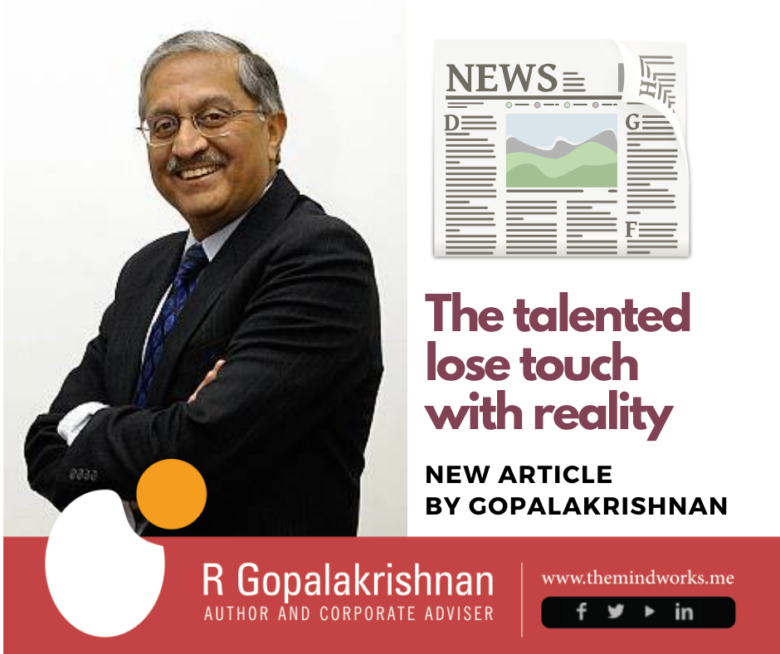02nd January 2017, BUSINESS STANDARD
(Nobody consciously seeks setbacks, but if a setback should happen, you can take a creative leap forward).
I wish my readers a happy new year, full of ideas and curiosity.
My curiosity was aroused by an American Chinese visitor, who said, “Every Indian has a rich environment for creativity—his or her life faces all the Cs required to be creative—chaos, challenges, curiosity, communications and channelization.” Can life challenges provoke curiosity and creativity?
“Yes,” writes Ms Modupe Akinola, Sanford Bernstein Assistant Professor, “Fostering creativity is vital to the odern economy, but to reach your personal best, sometimes you have to go through your worst.” (Ideas and Insights, Columbia Business School, 9th December, 2016). Anecdotal evidence links creativity to suffering. Think of the ancient Greek musician and poet, Orpheus, or the 19th century painter, Van Gogh, or modern-day singer Amy Winehouse. Philosopher Nietzsche was a tortured soul and believed that suffering spurred his creativity; Blaise Pascal, philosopher and mathematician, suffered ill-health. Poet Lord Byron wrote, “An addiction to poetry is the result of an uneasy mind in an uneasy body.”
Ms Akinola’s experiments suggest that those who receive a sharp, depression-producing critique of their work develop low levels of a hormone (called DHEAS for the curious!). Low DHEAS produces depression and emotional vulnerability, and that promotes high creativity! I found Akinola’s paper rather intriguing. While I mulled her paper and its averment with curiosity, I met Kamal Shah in Hyderabad. He is a strapping, forty something chemical engineer, who, along with Vikram and Sandeep, runs a successful start-up called NephroPlus, India’s largest chain of one hundred dialysis centres. The company is about seven years old, makes a profit (as normal businesses are supposed to), caters to about 7,000 dialysis customers every year, of whom a fourth depend on public-private partnerships to fund their treatment.
Almost like a dreamy visionary, Kamal asserts, “Our aim is that our dialysis guests (not patients, please note) should radiate positive energy, be strong in the self-belief that they can lead a full and normal life. At NephroPlus we combine technology, ethics and guest-centricity,” announces an infectiously enthusiastic Kamal Shah. Far from the cocky start-up kid profile that one reads about in the pink papers, Kamal Shah is a self-assured and passionate entrepreneur, who has already attracted three rounds of funding from investors. So is this another Gujarati guy, who has once again demonstrated the fabled entrepreneurial DNA? No, Kamal Shah leapt forward from a potentially debilitating health setback, almost as a walking proof of Ms Akinola’s hypothesis.
Cut to 14th July, 1997, when a gold medal-awarded chemical engineer prepared furiously to go to the US for his MS. To get the US visa, Kamal Shah had to undergo a vaccination, which threw up an unknown and rare setback—his kidneys were not functioning. How could it be, he was a super-active, healthy youngster? His energetic mind, supported by a loftily positive family, assumed that there was an aberration, which would pass. Over the next few years, Kamal faced hope-singeing treatments, tortuous pains, emotional trauma, a failed kidney transplant from his doting mother, and an infection arising from exposure to the 2004 Chennai tsunami. Curiosity-driven Kamal, through intense internet-searching and self-education on the subject, faced up to what became a gut-wrenching reality: he would have to depend on dialysis for the rest of his life.
He did not measure his DHEAS hormone, but it could well have been low. In a leap forward of curiosity and faith, he started a blog to share experiences with other dialysis patients. Bingo, he soon got an unsolicited message from entrepreneur Vikram, who roped in Sandeep. The three youngsters brainstormed on whether they could provide a happy solution rather than watch the world’s largest dialysis-stricken nation fail itself psychologically: yes, India is diabetes-capital of the world, so is the largest dialysis-needing nation in the world! The greatest asset of this team was that none of them knew anything about healthcare or dialysis. They were driven by unbridled curiosity arising out of their knowledge gap.
From the patient or customer viewpoint, traditional dialysis is perceived as a huge impediment because it limits your movements, activities and is infection-prone. The internet-search fired the neurons in their brains and seeded a concept into their minds: why not build a network of dialysis centres that puts the guest at the centre of the universe, where they are enabled to live a full, productive and long life? That would require thorough protocols and processes and a cadre of trained, dialysis technicians. They brainstormed, got some of India’s best nephrologists on board and formalised the protocols.
There is an acute shortage of well trained, qualified and ethical dialysis nurses and technicians. Well, they said to themselves, NephroPlus would produce such a cadre. Enpidia, NephroPlus’s Training Division was set up to recruit nurses and other undergraduates and graduates and to train them to handle dialysis guests. Over 350 Enpidia technicians support the NephroPlus dialysis centres as a living testimony to skill-building in India.
It is boring and threatening for the guest to sit around for the hours required to do the dialysis; so NephroPlus centres provide a television, WiFi and internet access so as to keep the guests cheerful. Pick-up and drop is also arranged so that they can come independently to the centre without depending on a family member. Listening to Kamal Shah’s story does persuade you that while nobody consciously seeks setbacks, if a setback does happen, you can take a creative leap forward.

